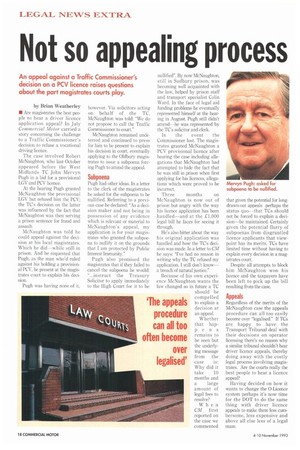Not so appealing process
Page 20

If you've noticed an error in this article please click here to report it so we can fix it.
by Brian Weatherley • Are magistrates the best people to hear a driver licence application appeal? In July Commercial Molor carried a story concerning the challenge to a Traffic Commissioner's decision to refuse a vocational driving licence.
The case involved Robert McNaughton, who last October appeared before the West Midlands TC John Mervyn Pugh in a bid for a provisional LGV and PCV licence.
At the hearing Pugh granted McNaughton the provisional WV but refused him the PCV; the TC's decision on the latter was influenced by the fact that McNaughton was then serving a prison sentence for fraud and assault.
McNaughton was told he could appeal against the decision at his local magistrates. Which he did—while still in prison. And he requested that Pugh, as the man who'd ruled against his holding a provisional PCV, be present at the magistrates court to explain his decision.
Pugh was having none of it, however. Via solicitors acting on behalf of the TC, McNaughton was told: "We do not propose to call the Traffic Commissioner to court."
McNaughton remained undeterred and continued to press for him to be present to explain his decision in court, eventually applying to the Oldbury magistrates to issue a subpoena forcing Pugh to attend the appeal,
Subpoena
Pugh had other ideas. In a letter to the clerk of the magistrates he asked for the subpoena to be nullified. Referring to a previous case he declared: "As a decision maker and not being in possession of any evidence which is relevant or material to McNaughton's appeal, my application is for your magistrates who granted the subpoena to nullify it on the grounds that I am protected by Public Interest Immunity."
Pugh also promised the magistrates that if they failed to cancel the subpoena he would: "...instruct the Treasury Solicitor to apply immediately to the High Court for it to be nullified". By now McNaughton, still in Sudbury prison, was becoming well acquainted with the law, helped by prison staff and transport specialist Cohn Ward. In the face of legal aid funding problems he eventually represented himself at the hearing in August Pugh still didn't attend—he was represented by the TC's solicitor and clerk.
In the event the Commissioner lost. The magistrates granted McNaughton a PCV provisional licence after hearing the case including allegations that McNaughton had attempted to hide the fact that he was still in prison when first applying for his licences, allegations which were proved to be incorrect.
Three months on McNaughton is now out of prison but angry with the way his licence application has been handled—and at the £1,000 legal bill he faces for seeing it through.
He's also bitter about the way his original application was handled and how the TC's decision was made, In a letter to CM he says: "I've had no reason in writing why the TC refused my application. I still don't know— a breach of natural justice."
Because of his own experience McNaughton wants the law changed so in future a TC should be compelled to explain a decision at an appeal.
'The appeals procedure
Whether that happens remains to be seen but the underlying message from the case is: Why did it take 10 months and a large amount of legal fees to resolve?
When CM first reported on the case we commented that given the potential for longdrawn-out appeals perhaps the status quo—that TCs should not be forced to explain a decision—be maintained. Certainly given the potential flurry of subpoenas from disgruntled licence applicants that viewpoint has its merits. TCs have limited time without having to explain every decision in a magistrates court.
Despite all attempts to block him McNaughton won his licence and the taxpayers have been left to pick up the bill resulting from the case.
Appeals
Regardless of the merits of the McNaughton case the appeals procedure can all too easily become over "legalised." If TCs are happy to have the Transport Tribunal deal with their decisions on operator licensing there's no reason why a similar tribunal shouldn't hear driver licence appeals, thereby doing away with the costly legal process involving magistrates. Are the courts really the best people to hear a licence appeal?
Having decided on how it wants to change the 0-Licence system perhaps it's now time for the DOT to do the same thing with driver licence appeals to make them less cumbersome, less expensive and above all else less of a legal maze.




























































































